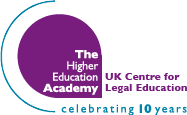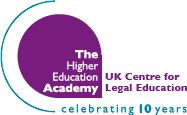The standardised client
Paul Maharg, Glasgow Graduate School of Law, and Clark Cunningham, Georgia State University, USA

This workshop was aimed at those interested in the use of standardised clients (SCs) in undergraduate or postgraduate legal education. Clark opened the workshop with an overview of the work of the Effective Lawyer-Client Communication Project, followed by Paul, who gave an outline of the SC pilot at Glasgow Graduate School of Law. Jean Ker of Ninewells Hopsital and Medical School, University of Dundee, then presented an overview of the use of standardised patients in medical education. Five discussants explored the key issues for legal education, followed by an open discussion session.
Paul and Clark’s paper, Do we value what clients think about their lawyers? (PDF format, 7 pages, 76.49 KB), can be downloaded from the Effective Lawyer-Client Communication Project website, which also includes a bibliography of effective lawyer-client communications.
The SC has appeared in recent years under a number of guises; simulated patients, standardised clients, mystery shoppers, pseudo-customers. A range of disciplines have used them – marketing, community pharmacy, medical education, legal services. The concept of standardisation in skills learning, teaching and assessment, however, is a complex one. Obviously, there is a need for standardisation of performance in teaching and learning activities involving SCs, but there are a number of fundamental methodological and procedural issues associated with standardisation that require to be addressed, and it was the function of this workshop to crystallise these issues.
For example – what are these standards? Whose standards are they? Who sets them? How are they to be derived? What is best practice in their implementation? What is best practice in the training of SCs? If the SCs are also used to assess competence in some way, then standardisation of assessment processes becomes an important issue – the above questions and many more require to be answered.
In the workshop we aimed to:
- Collect and then disseminate information about the state of the art in both research about lawyer-client communication and in teaching these communication skills (including the issue of assessment). We welcome colleagues working on quality assurance and measurement in actual practice settings (for example customer satisfaction, mystery shopper clients, etc), as well as skills-based simulations in other disciplines, such as social work, pharmacy, medical education.
- Brainstorm and seek potential collaborators for expanding the existing base of empirical research on actual lawyer-client communication, so that as we design the standardised client pilot we feel some confidence that our normative judgments about what constitutes competent interviewing are more than just a reflection of our opinion and biases.
- Inform participants about an international project on the standardised client organised by the Burge Endowment Fund (Georgia State University), Glasgow Graduate School of Law and the College of Law.
Given the outcomes-based focus of the recent Training Framework Review in England and Wales, the ongoing review of the Diploma in Legal Practice in Scotland and recent moves to provide alternatives to the Bar Exam in the USA, this is an essential subject for skills-based education in all its forms.
About Paul and Clark
Paul is Co-Director of Professional Practice Courses at Glasgow Graduate School of Law. His publications lie in the fields of legal education and legal critique, and he has given numerous conference papers and presentations on ICT in legal education. Paul is currently consultant with the government-funded RechtenOnline Foundation in the Netherlands, a member of the editorial boards of several journals, Chair of BILETA and a member of two educational committees within the Law Society of Scotland.
Clark is the W Lee Burge Professor of Law and Ethics at the Georgia State University College of Law in Atlanta, USA, where he directs the Criminal Justice Clinic and teaches legal ethics and comparative constitutional law. He is a widely cited expert on the lawyer-client relationship and currently directs the Effective Lawyer-Client Communication Project, an international collaboration of law teachers, lawyers and social scientists. Clark’s work has been published widely and he has been a visiting scholar at several institutions. He directed a three year Ford Foundation project to support the development of law school clinics in India and served on the first steering committee of the Global Alliance for Justice Education.
Last Modified: 12 July 2010



Comments
There are no comments at this time